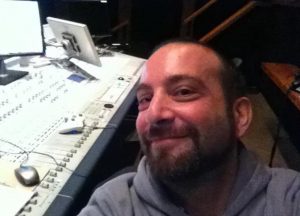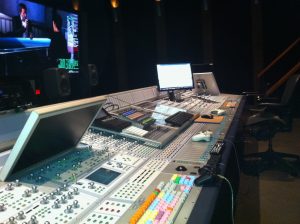
Many thanks to Brad Dyck for contributing this interview. You can follow Brad on Twitter @Brad_Dyck
BD: How did you get involved in game audio?
BD: What were you using to compose at EA?
BD: I know your resume is pretty long for composing, do you still do that right now?
BD: Were you tempted at all to do any composing for Sleeping Dogs?
BD: Yeah, I thought it might be compelling for a composer to do a Hong Kong inspired soundtrack but I could also see it being daunting to do that type of style.
Sleeping Dogs was the most complicated project that I’ve ever worked on. I thought hockey was hard (from a play by play and crowds perspective). Developing any open world game is challenging. So that was certainly a huge learning experience. It was like working on, Need for Speed, UFC, Dead Space, and Tomb Raider all in one project.
BD: …and cockfighting
BD: Did you have a certain deadline that you were already working towards and Activision just realized that you weren’t going to meet it? Or you needed more time than they were willing?
BD: They were worried about it coinciding with GTA?
Then, all of a sudden it happened and it was a bittersweet thing. I know a lot of us were partially relieved and partially devastated because this thing that we worked on for about 3+ years was all of a sudden gone. Plus, It was a blow to the ego to have something you poured so much blood, sweat and tears into cancelled, “Oh, it’s not good enough.” You couldn’t point a finger at anyone, it was just circumstance. We needed more time, and anyone would’ve needed more time. Look at LA Noire: 7 years in development, GTA 4: 5 years in development…
I remember the 6 months after the cancellation when things were slow, True Crime was starting to become a distant memory. When we first heard about Square showing interest in reviving it, we were like, “What!? Are you fucking serious?” A lot of us were freaked out, “Oh, man, no, we don’t want to pick that thing up again!” but slowly it turned out to be such a great relationship with the folks from Square Enix. They handled things differently.
BD: Did any of the fundamentals change after it got picked up by Square, audio or otherwise?
BD: Were you able to do any of the hands on sound design for the game?
BD: What sort of areas did you focus on?
BD: I read the interview you did with Audiokinetic, I wanted to ask more about the external sources update they did. You mentioned that it assisted you with managing RAM, I was curious how exactly did it help?

BD: I can only imagine what your dialogue must’ve looked like.
BD: So it connects from somewhere outside of Wwise?
BD: What sort of sounds did you capture specifically for the game through field recording? You mentioned before that you went to Hong Kong.
In the studio, the voice actors actually re-wrote a lot of the script because the script was written by Canadians living in Vancouver trying to be Hong Kong gangsters. It didn’t translate well so Eddie and the actors fixed it. Yeah, it slowed down the sessions, but in the end it was for the better! A lot of the actors were young hip kids who had an ear for the street and were able to inject some authenticity to the dialogue. It was funny because they were yelling out crazy stuff and laughing hysterically. I’m saying, “Ok, what’s going on, what are you guys saying here?” And Eddie answers, “Aah, man, I don’t know if this’ll be allowed in the game, some of this stuff is really rude but it’s authentic, it’s authentic!” And I’m saying, “Okay, let’s keep it, let’s keep going.”
BD: You can get away with it more when it’s in a different language.
BD: Was the actor who played Wei from Hong Kong as well?
BD: That would be a lot of dialogue to re-record.
BD: Did you attend any of the sessions where Will would have to sing the karaoke songs?
BD: Really? It sounds like him.
BD: One thing I liked about it was that it sounded like karaoke, it didn’t sound too good like he was doing crazy vibrato or anything, it really captured how it actually sounds.
BD: When you were in Hong Kong, did you notice any distinctive sounds?
An important goal that the development team tried to achieve was to recreate the density of Hong Kong. One of the memorable experiences that I took away from there was the density. Hong Kong is crowded. Definitely the most crowded city I’ve been to. It was a challenge to recreate that especially from a visual point of view because the game was only able to afford so much memory for ambient crowds. Our producers were relentless in trying to push us to achieve the desired level of density.
BD: Try to make the mix to feel more crowded?
BD: You’ve got to put more people in.
BD: Did you do any recording outside to get an outside sound?
BD: How many cars did you put in the game?
To record engines in the old Need for Speed days, we would wire up mics to the car at various locations like under the hood, by the exhaust and inside. We’d route the mics to a Tascam DA-88 8-track digital recorder that was on the backseat. We’d drive the car on the street, late at night. You get some great results but also a lot of issues with wind and road noise, melting mics in the engine and damaging cars from applying the brakes too much. One of the most important qualities you need when recording engines for a loop based model is to maintain a steady rpm for as long as you can. In order to achieve this, one needs to apply the brakes as you drive. One time, when I returned a rental car, I realized that all 4 hubcaps were missing. This was because they melted off from the heat of the brakes.
Once we were introduced to Dynapacks our lives became a whole lot easier. Dynapacks are like treadmills for cars only they apply load to the vehicle. So you can record an engine under load while stationary.
BD: There were a lot of great radio stations in the game, how did that come about with labels like Warp, Ninja Tune and Roadrunner?
BD: It was a package deal.
BD: It had a lot of really good Hong Kong stations too. There was that one song that has a lady kind of screaming, what was that?
BD: Was that a real artist?
BD: I remember that, I wondered if you chose specific radio songs to be in the background for certain cut scenes or missions.
BD: What sort of changes do you think will be possible in terms of game audio for the next generation?
BD: Yeah.
BD: It was the most realistic sounding surround that I’ve heard but it does necessitate headphones, doesn’t it?
One method for recreating 3D audio that’s been around for a while is HRTF (Head Related Transfer Function). HRTF creates 3D audio imaging by utilizing parameters like volume, filter, delay and reflections in complex algorithms. I remember in the late 90s, Aureal Vortex included the tech with their speakers. They had a demo where you position yourself in front of the speakers to listen as you watched an animation of a bee buzzing around your head. It worked pretty well even without headphones (yes, it is possible to experience 3D without headphones).
Once 3D audio in gaming gets to the level of quality as demonstrated in the Virtual Barber people will look at 5.1 systems as a thing of the past. I’ve been looking around to see who’s been using 3D audio in gaming and have found that there’s quite a bit of movement going on. There’s an i-Phone game called Papa Sangre that features it as its sole gaming mechanic. It’s a game you play using your ears. It’s pretty cool. I tried it and thought its imaging isn’t as realistic as the Virtual Barber, but we have to put it into perspective that this tech is young and will only improve as long as there are people eager to improve it.
I’m sure you’ve noticed that it’s been a tough time in the industry lately. Not only are we entering a long overdue console transition, add to the mix all the new gadgets that everyone has, smart phones, tablets and the whole new model of free to play. It seems like budgets for games have polarized. You’re either going to get GTA V or Candy Crush.
I look forward to working with the new consoles which will provide more freedom and new challenges. It’ll be a sound designer’s dream compared to when I started off.
BD: Yeah, no restrictions at all.
Saki’s journey in sound began with music and the guitar. Since then he’s explored music composition, sound designing, building synthesizers, playing music with people and working with game developers as an audio director, currently with United Front Games. He live’s and works in Vancouver, Canada.
Great interview, and thank you for getting technical about the Wwise systems you had to employ to get under budget. I’ve not worked with External Sources but have heard some great things about them.
Guess it’s time to play Sleeping Dogs!